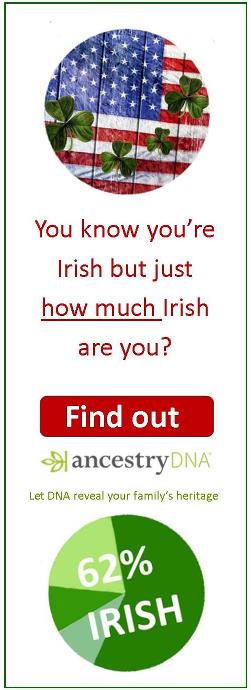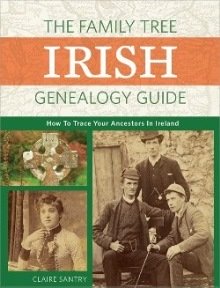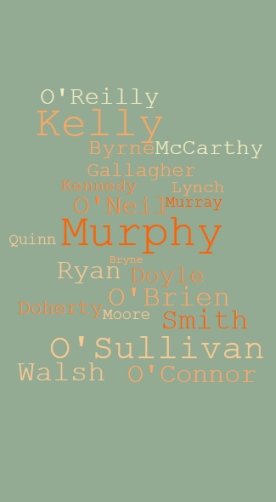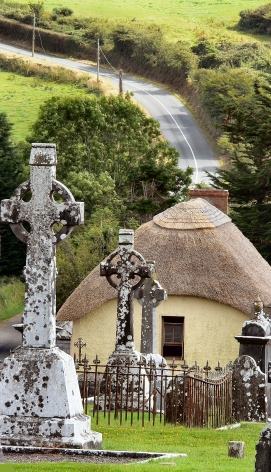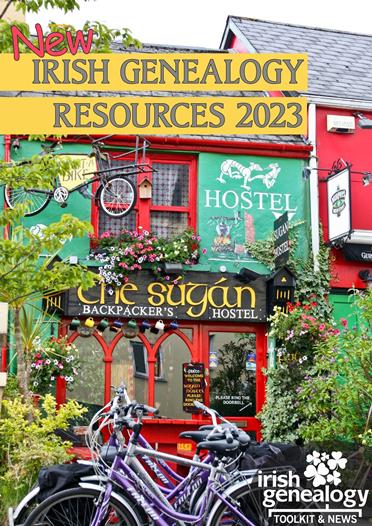- Home ›
- Irish Names ›
- Irish Surnames
Top 20 Irish surnames
The Irish surnames highlighted in the list below were the 20 most numerous in 1890, according to a study by Robert Matheson, then Registrar-General of Ireland.
In his Special Report on Surnames in Ireland, Matheson estimated the total number of people living on the island bearing the 100 most numerous names, and he indicated the counties and provinces in which each was most common.
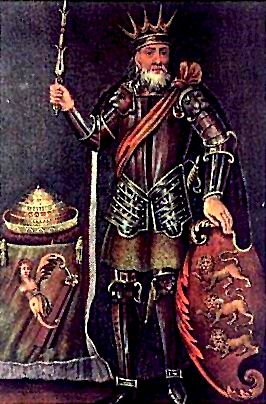 One of the earliest Irish surnames, O'Brien, dates back to the 12th century when the grandson of Brian Boru, High King of Ireland, honoured him by taking his name.
One of the earliest Irish surnames, O'Brien, dates back to the 12th century when the grandson of Brian Boru, High King of Ireland, honoured him by taking his name.In addition to including some of Matheson's findings and calculations in the list below, I've added statistics revealed by Griffith's Valuation (a survey of households and land carried out county-bycounty between 1848 and 1864) and brief details about the origin of each of the names.
Other sources mentioned include the 1990s research findings of genealogist and tutor Sean J Murphy, which, like the earlier reports and surveys, cover the entire island. However, the most recent (2020) statistics mentioned in some of the text below relates to analysis carried out by the Irish Republic's Central Statistics Office and does not cover Northern Ireland.
The surnames below are in descending order of frequency ie Murphy is the top name.
The Irish surnames highlighted in the list below were the 20 most numerous in 1890, according to a study by Robert Matheson, then Registrar-General of Ireland.
 One of the earliest Irish surnames, O'Brien, dates back to the 12th century when the grandson of Brian Boru, High King of Ireland, honoured him by taking his name.
One of the earliest Irish surnames, O'Brien, dates back to the 12th century when the grandson of Brian Boru, High King of Ireland, honoured him by taking his name.In his Special Report on Surnames in Ireland, Matheson estimated the total number of people living on the island bearing the 100 most numerous names, and he indicated the counties and provinces in which each was most common.
In addition to including some of Matheson's findings and calculations in the list below, I've added statistics revealed by Griffith's Valuation (a survey of households and land carried out county-bycounty between 1848 and 1864) and brief details about the origin of each of the names.
Other sources mentioned include the 1990s research findings of genealogist and tutor Sean J Murphy, which, like the earlier reports and surveys, cover the entire island. However, the most recent (2019) statistics mentioned in some of the text below relates to analysis carried out by the Irish Republic's Central Statistics Office and does not cover Northern Ireland.
The surnames below are in descending order of frequency ie Murphy is the top name.
1. Murphy
In Griffith's Valuation, a total of 13,539 Murphy households were recorded across the island, making Murphy the most numerous of Irish surnames in the mid-19th century. It was most prevalent in Cork (3087 households), Wexford (1688), Kilkenny (888). Smallest incidence in Donegal (32) and Derry (66).
Total population of Murphys in Ireland in 1890 was estimated at 62,600. It was one of the most well distributed of Irish surnames, most common in counties Dublin, Wexford and Cork.
Meaning, Origin, and Miscellaneous information: From the two Old Irish surnames, O'Murchadha and MacMurchadha, both meaning 'sea warrior'. For reasons unknown, the Murphys of the 19th and 20th centuries chose not to re-adopt either the O' or Mac prefixes. In 1992-97, about 70,900 Murphys were telephone subscribers in Ireland (Northern and Republic)*.
In the Republic, an analysis by the Central Statistical Office of the surnames of children whose births were registered from January to December 2020 found Murphy was still the number one surname (with 602 newly-arrived little Murphys counted).
* Source: Sean J Murphy,
A Survey of Irish Surnames 1992–97.
Meaning, Origin, and Miscellaneous information: Murphy comes from the two Old Irish surnames, O'Murchadha and MacMurchadha, both meaning 'sea warrior'. For reasons unknown, the Murphys of the 19th and 20th centuries chose not to re-adopt either the O' or Mac prefixes. In 1992-97, about 70,900 Murphys were telephone subscribers in Ireland (Northern and Republic)*.
In the Republic in 2020, an analysis by the Central Statistical Office of the surnames of children whose births were registered during 2019 found Murphy was still the number one surname (with 683 newly-arrived little Murphys counted).
2. Kelly
Griffith's Valuation recorded 11,518 Kellys and only 57 O'Kellys. Most were in Galway (986), Roscommon (815) and Mayo (595). Ulster had 2,640 Kelly entries, but only 65 were in Fermanagh.
A total population of Kellys was estimated at 55,900 in 1890. The name appeared in all counties but was most common in Cork, Galway, Mayo, Dublin, Roscommon.
Meaning, Origin, and Miscellaneous information: The derivation of the name is not certain. It may have come from ceallach, meaning 'strife'. In
Irish, the name is written O'Ceallaigh. Originally only a surname, it
became first a boy's first name and, later, a girl's name.
3. O'Sullivan
Of the 8,000 O'Sullivan or Sullivan households recorded in Griffith's Valuation in the middle of the 19th-century, nearly three-quarters were in Cork (3388) or Kerry (2567). Some 15 counties had less than 20 households with this name.
Little had changed by 1890, when some 90% of O'Sullivans were estimated to be in Munster.
Meaning, Origin, and Miscellaneous information: Internationally recognised as one of the great Irish surnames, O'Suileabhan, meaning 'hawk-eyed' or 'one-eyed', remains the most common name in counties Cork and Kerry. In 1992-97 there were approx 41,500 telephone subscribers of this name across the island of Ireland*.
In 2020, an analysis by the Republic's Central Statistical Office of the family names of children whose births were registered in the previous year found the 348 newly-arrived O'Sullivans made it the eighth most common surname.
4. Walsh
Of the 9,843 households named Walsh/e, Welsh, Welch or Brannagh who appear in Griffith's Valuation (1847-1864), the largest clusters were found in counties Kilkenny (1,420), Cork (1,357) and Mayo (1,092).
The name was most common in Galway, Dublin, Wexford, Cork and Mayo. Numbers were lowest in Ulster.
Meaning, Origin, and Miscellaneous information: The name was originally Breatnach, meaning 'from Wales', which arrived in Ireland with the Norman invaders. The name is usually pronounced 'Welsh; in Munster and Connacht.
An
analysis by the Republic's Central Statistical Office of the family names of children
whose births were registered in 2020 found the 383 newly-arrived Walsh's and the seventh
most common surname for that year.
5. Smith
Scattered across the island, Smith households were most numerous in Counties Cavan (1,074), Down (635) and Meath (578).
More than half the Smiths were in Ulster, and more than one quarter in
Leinster.
Meaning, Origin, and Miscellaneous information: Although England's most common surname, Smith in Ireland does not necessarily suggest an English ancestry. Many MacGowans (whose name derives from gabhann, meaning 'smith' ie blacksmith) had their name translated into English 300 to 400 years ago.
In 2020, the Republic's Central Statistics Office analysed the surnames of babies born and registered during the previous year. Surprisingly, Smith did not make it into the top 10.
6. O'Brien
One of the great Irish surnames centred on Munster, the largest concentrations of O'Brien households were found in Cos Limerick (725), Claire (511), Tipperary (455) and Cork (418). Without the 'O' prefix, the name was most common in Cork (806) and Tipperary (628). Smallest numbers in counties Wicklow, Carlow and Kilkenny.
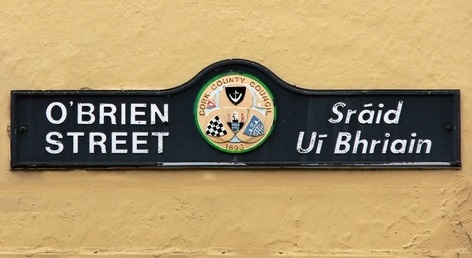 O'Brien Street, Cork City.
O'Brien Street, Cork City.Of the estimated 490 O'Brien registered births in 1890, all were in Munster or Dublin (105). Without the 'O' prefix, there were around 80 births registered, in counties Meath, Kilkenny, Wicklow and Wexford.
Meaning, Origin, and Miscellaneous information: In Irish, O'Briain, meaning descendant of Brian (Boru), the name means
'exalted one' or 'eminence'. Its original homeland is Co Clare, but it
is now scattered across Ireland. There were 29,400 telephone subscribers
of this name in Ireland in 1990. In 2020, the Central Statistics Office
(RoI) analysed the surnames recorded in the previous year's civil
registration of births registers; O'Brien (with 467 infants registered) was the third most common.
7. Byrne
By far the most prevalent county for Byrne households in the mid-19th century was Wicklow where it was recorded 1203 times. The neighbouring counties of Dublin (893), Carlow (572) and Wexford (534) were the next largest concentrations. The smallest numbers were found in Derry (9).
Leinster was the great stronghold of this name, with five times more Byrnes than the other three provinces combined. More than half (301) of the 568 Byrne births in 1890 were in Co. Dublin; 87 were in Co Wicklow.
Meaning, Origin, and Miscellaneous information: O'Broin, meaning raven, can be traced back to Bran, the son of an 11th-century king of Leinster. It remains one of the most common Irish
surnames in Wicklow and neighbouring counties, and in 2020 was the fifth
most common surname to appear in the civil registration of births
registers (up from seventh the year before).
8. Ryan
There were 8,871 Ryan households recorded in Griffith's Valuation (a survey carried out across the island between 1847 and 1864). Nearly half (4,090) were in Tipperary. Limerick had 1,263 while the next most numerous were counties Kilkenny (616) and Cork (409).
In 1890, more than half of all Ryan births were in Munster, especially counties Tipperary, and then Limerick. There were only 13 entries in all of Ulster, and just 49 in Connacht.
Meaning, Origin, and Miscellaneous information: In Old Irish, the name was spelt O'Mulriain; in Modern Irish, it's O'Riain. It's long been the most numerous of Irish surnames in Tipperary, and has become a popular first name. It means 'little king', and the sept of this name was from the Tipperary/Limerick borders.
In 2020, the Republic's Central Statistics Office found the family name Ryan took third place in its Top 10 Surnames of Babies Registered from January to December of that year (by number).
9. O'Connor
In the mid-19th century, the singular form of Connor was the most numerous of varients for this name, with 5,377 households being found mainly in Kerry and Cork. There were also 1,749 using the plural form Connors (especially in Wexford and Waterford). Those households using the name O'Connor numbered only 841 and were mainly in Munster.
Of 266 Connor/O'Connor births in 1890, 80% were in Kerry, Cork, Limerick, Dublin, Clare and Galway. Just 13 were in Ulster.
Meaning, Origin, and Miscellaneous information:The name comes from Conchobar, meaning 'lover of hounds', and remains very common in Kerry. The O' prefix, formerly
discarded, has now resumed its position, and in an official Top 10 of Surnames of Babies Registered in 2020, took sixth place.
10. O'Neill
The Neills and O'Neills were fairly evenly split with 2578 and 2720 households respectively. Just one fifth (537) of the former and more than half (1412) of the latter were in the six counties that now make up Northern Ireland.
There were 407 O'Neill births in 1890. They covered nearly all counties but more than half were in Dublin, Antrim, Cork and Tyrone. Only 28 were in Connacht.
Meaning, Origin, and Miscellaneous information: O'Neill means descendent of Niall, a first name which means 'vehement'. The main O'Niall family, centred on Tyrone, descended from Niall of the Nine Hostages, but there were other, separate, groups in Carlow and Waterford. It's still a very big name in Ulster.
11. O'Reilly
Griffith's Valuation (1847-1864) shows that by far the greatest concentration of Reilly households was in County Cavan (1759). The next largest, Meath, had only 579 examples. Reilly households outnumbered O'Reillys nearly 20-1.
County Cavan remained the stronghold of Reillys with 137 births registered in 1890. But there were 319 births elsewhere, including 93 in Dublin and 78 in Longford. Only 10% of Reillys used the O' prefix at this time.
Meaning, Origin, and Miscellaneous information: What a difference 100 years can make! By the dawn of the 21st century, almost 60% of Reillys used the O' prefix.
The name comes from raghallaigh, possibly meaning 'sociable tribe or group'. The
origins of the Reillys lies in Breffny (a kingdom based across modern-day counties Cavan and Longford where it remains the most common surname).
12. Doyle
Griffith's Valuation (a survey taken between 1847 and 1864) found there were 4,634 Doyle households recorded across Ireland. More than half were in Wexford (1,169), Wicklow (556), Carlow (393) and Dubliln (330). The smallest numbers were in the far northwest.
Of the 360-odd Doyle birth registrations in 1890, three-quarters were in Counties Dublin (162) and Wexford (102). Other 'big' Doyle counties were Kildare, Carlow and Wicklow.
Meaning, Origin, and Miscellaneous information: One of several common Irish surnames which didn't re-attach the O' prefix, the surname comes from the Irish for 'dark stranger' possibly meaning Vikings, and is not believed to have any Celtic connections.
13. McCarthy
With 2,298 households, County Cork had by far the highest proportion of the 3,830 McCarthy entries in Griffiths Valuation (1848) . There were also 1203 Carty and 534 Carthy households.
The southwest of the island remained the stronghold in 1890, with an estimated 90% of the McCarthy population in Munster. Of about 380 McCarthys, 72% were in Cork.
Meaning, Origin, and Miscellaneous information: The name means 'loving' (ahhhh), and derives from Carthach, an 11th century king of Cashel. In the 12th century the dynasty was exiled from Tipperary and relocated to Cork and Kerry. About 60% of McCarthy families hail from Cork.
14. Gallagher
Although spread wide geographically, the 4,125 Gallagher households recorded in Griffith's Valuation were most common in 1847-1864 in north western counties, especially Donegal (1,732) and Mayo (627). The smallest numbers were in Kilkenny and Tipperary (just 7 combined).
By 1890, Ulster (principally Donegal) still held the greatest number of Gallaghers, with Connacht in second place.
Meaning, Origin, and Miscellaneous information: And little has altered into modern times. Gallagher still holds the number one spot for Irish surnames in County Donegal.
Meaning 'foreign helper', the Old Irish spelling is O'Gallchobhair; the
Modern Irish Gallachoir. It has more than 20 variant spellings, and
descends from a son of Niall of the Nine Hostages.
15. Doherty
Some 3,033 Doherty and 918 Dogherty households were recorded in Griffith's Valuation (1847-1864) with the largest numbers in counties Donegal (1,430 and 290 respectively) and Derry (319 and 155 respectively).
Ulster was still the the province most densely populated with Dohertys in 1890. All other provinces had only small numbers.
Meaning, Origin, and Miscellaneous information: Originally the Dohertys were one of the great families of the Inishowen peninsula, and another that's descended from Niall of the Nine Hostages, the Dohertys are still especially numerous in counties Donegal and Derry. The name means 'unlucky' and took 14th place in a 1996 survey of common Irish surnames.
16. Kennedy
Of the 4,820 Kennedy households recorded in Griffith's Valuation (1847-1864), just under a quarter (1,112) were located in County Tipperary. The remainder were scattered across the island. Limerick had 262, Antrim 258, Down 211 and Kilkenny 232.
Still widely distributed in 1890, the province with the lowest population of Kennedys was Connacht. County Tipperary saw the highest number (70) of Kennedy births, with Dublin in second place with 51.
Meaning, Origin, and Miscellaneous information: The Old Irish spelling is O'Ceanneidigh, which means 'ugly head'. This Irish surname descended from a nephew of Brian Boru. The family were Lords of Ormond throughout the early medieval period before splitting into three distinct groups and dispersing.
17. Lynch
Another of the great Irish surnames centred on Munster, Griffith's Valuation (1847-1864) recorded 658 Lynch households in County Cork, 400 in Kerry, 274 in Limerick, 261 in Clare and 220 in counties Tipperary and Waterford. Other significant groupings were found in Cavan (516 households) and Meath (300).
In 1890, some 188 Lynch births were registered. While County Cavan ranked at the top, with 51 births, County Meath was pushed into 5th place with only 17. Kerry had 41, Limerick 31, Clare 23, Westmeath 14, and Louth 11.
Meaning, Origin, and Miscellaneous information: A name with two distinct derivations, one of them the French/Norman name of De Lench. The other is of Celtic Irish origin, from O'Loingsigh, meaning 'mariner'.
18. Murray
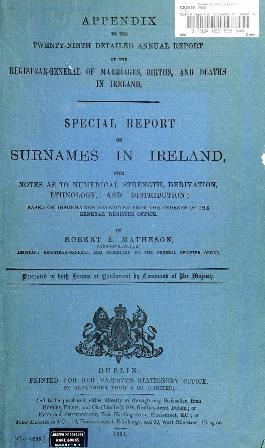
There were 4,455 Murray households in Griffith's Valuation and an additional 248 that clung firm to the Mc prefix. Well-distributed throughout the island, there were significant groups in Co Cork (356 households), Co Roscommon (278), Co Down (277) Co Galway (262), Co Meath (235). The McMurrays were nearly all in the north east of the island.
Some 145 Murray births were registered in 1890. 60 were in Dublin, the remainder in Down (33) and counties in the Midlands.
Meaning, Origin, and Miscellaneous information: Murray derives from the Irish 'Muireb', meaning 'seafarer'. A considerable number of the Ulster Murrays are of Scots or Flemish origin.

19. Quinn
A well-scattered name, 4442 Quin/Quinn households were recorded in Griffith's Valuation. They were most common in Co Tyrone (663), Co Galway (297) and Co Tipperary (265).
There were 121 Quinn births in 1890. Tyrone, unsurprisingly, took top ranking as the location of 40 of them. Counties Armagh and Roscommon recorded 26 and 25 each, while Monaghan and Longford was home for the remainder.
Meaning, Origin, and Miscellaneous information: The name is derived from O'Cuinn (descendent of Conn) meaning 'wisdom' or 'chief'. It still holds the top spot for Irish surnames in Tyrone but remains well-distributed across the island.
20. Moore
Although the Griffith's Valuation surveyors found Moores in all counties as they carried out their survey in 1847 to 1864, the name was most common in Counties Down (404 households), Antrim (376) Laois (290) and Tyrone (237). The smallest numbers were in Counties Sligo (13 households), and Co Clare (20).
By 1890, Connacht and Munster had the smallest number of Moores. The name was most numerous in Counties Kildare, Tyrone, Dublin, Derry and Antrim.
Meaning, Origin, and Miscellaneous information: The O'Moores were a leading sept in County Laois but those that carry the name today may be of English, Irish, Scottish or Welsh origin. In Old Irish, the name derives from Mordha, meaning 'stately/noble'.
